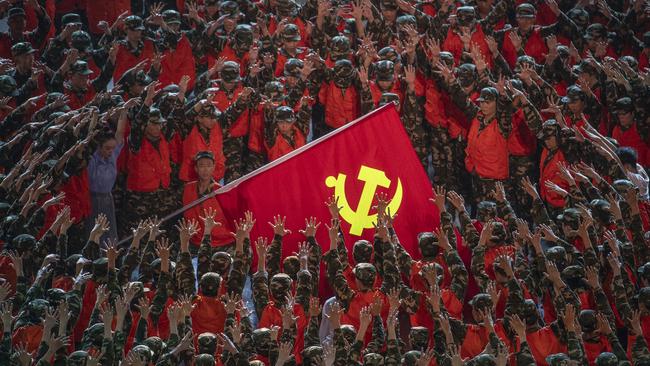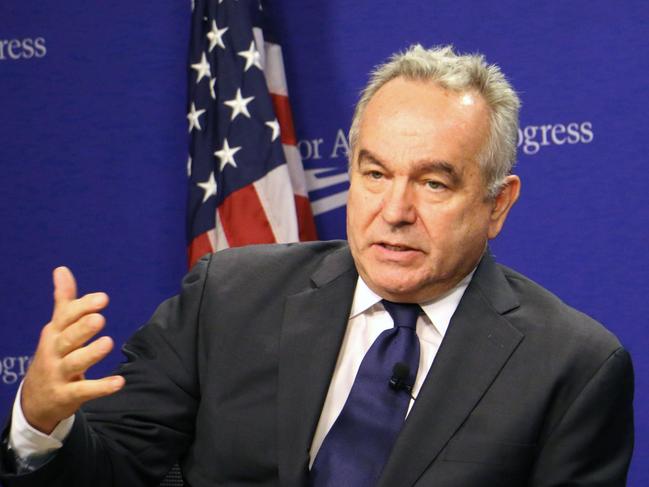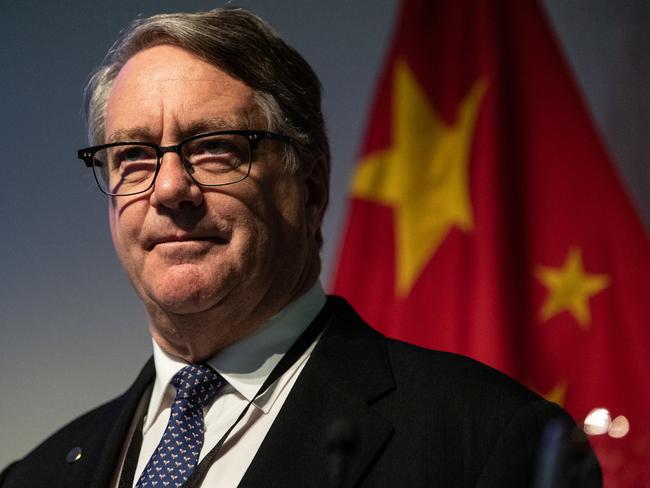Australia has shown great resilience in the face of China’s aggression
China must be surprised that Australia hasn’t buckled. But Beijing’s aim is to break our resolve and our weakened federation.

This is an existential moment for Australia, with much of the world watching. It is a dangerous situation because Beijing, having triggered the confrontation, can hardly afford to lose. Yet the remarkable feature so far is Australian resilience, the resolve of public opinion and the recognition by most of the business sector that economics cannot be traded against national security.
Campbell advised Australia to be “settling in for long haul”. In fact, this has been the operating rule for Scott Morrison for some time. He has worked urgently to build coalitions of “like-minded countries and liberal democracies” to “push back against coercion” and achieve an Indo-Pacific region that is “open, inclusive and resilient”.
China’s retaliation against Australia is integral to the escalating great power strategic competition between China and the US, the issue being whether Australia succumbs as a client state or maintains its autonomy via the regional balance of power. Morrison’s speeches make it clear this is how he sees the contest.
We cannot know Beijing’s calculations. Yet China must be surprised that Australia hasn’t buckled to some degree. If you had said to people three years ago that China would threaten Australia’s coal, barley, wine, beef, education, lobster and timber industries but the government and public would stand firm, the reaction would have been disbelief.
Yet this week Josh Frydenberg felt able to state: “We will not put economic interests first, we will put the broader national interest first.” He means the security interest.
The transition is astonishing. One of Campbell’s revealing lines in his Asia Society remarks this week was his perception a decade ago that Australia was susceptible to shifting away from the US towards a closer relationship with Beijing. The opposite has happened.
This highlights past US worries about the economic potential in Canberra-Beijing relations but, more significantly, China’s madness in replacing seduction with coercion in its dealing with Australia.
Campbell, often called the President’s Asia tsar, said the Biden administration saw China’s economic retaliation against Australia as designed to “cut Australia out of the herd” of US allies and “to try to see if they can affect Australia to completely change how it sees itself and the world.”

This goes to national identity. It is exactly how Morrison sees the challenge. This was made clear in his Perth speech last month when the Prime Minister said today’s challenges were about “where we are and who we are – our principles, our values and, of course, our national character”. Morrison has bet the house on Australian resilience against Beijing’s pressure. The question therefore becomes: what is Australia’s potential fault line? There are many possibilities. A Liberal-Labor split over China; commercial revolt over the pressure; a public that loses faith; or a schism in the federation. If you are betting, put a fractured federation at the shortest odds.
The empowerment of the premiers during Covid-19 isn’t a passing phenomenon. Australian politics is being transformed. Sooner or later disputes over China policy will see the premiers flex their muscles – another instance of a core change in power relations.
During his Perth visit last month, Morrison saw West Australian Labor Premier Mark McGowan, after which McGowan launched an assault on the PM, extraordinary even by his standards. “We are acting against our own interests,” McGowan said.
“The Prime Minister has a view he needs to attack (China) on trade. I’m more pragmatic, I’m more attuned to the interests of Western Australia and West Australians jobs. We sell them literally 20 times as much as we buy from them, why do we want to undermine that?
“I have been very clear with the commonwealth. I’m a premier of a state that actually carries the nation’s economy.”
McGowan branded the recent language from federal politicians and senior officials about possible war with China as “absolute madness” and “insane”. He said: “WA continues to trade through Covid with countries that buy our products, particularly when iron ore is over $200 a tonne. That’s what’s supporting the national economy, and yet we have politicians who want to destroy that.
“We have a massive trade surplus with China that employs hundreds of thousands of Australians, particularly here in Western Australia. If we lose our trading relationship with China, the economic consequences for Australia will be absolutely catastrophic.”
McGowan said he and Morrison had a “very different” view of China relations. Have no doubt, this is a deep dispute and McGowan has great leverage here. China’s foreign ministry welcomed his remarks. The iron ore trade is safe for the time being – but for how long? If China cuts back the iron ore trade, there will be a political crisis between Perth and Canberra and McGowan will sheet the blame to Morrison. And don’t doubt that he will get traction in the West.
The story with business is far better. Deeply experienced in China business dealings and chair of the Business Council of Australia Global Engagement Council, Warwick Smith, made three points to Inquirer: most states still enjoy effective relations with Beijing; business accepts the national security imperative embraced by the Morrison government on China; and business should take the initiative to engage with the Beijing government.
The Morrison government has worked hard to secure corporate alignment with its China policy. This became a political necessity. Failure on this front would have been disastrous. “We understand the position of the government,” Smith said. “The fundamental point is that China has changed; it’s not Australia that has changed. It means we have to work out how we adapt and maintain our commitment as a trading nation with a heavy reliance on North Asia.
“For nearly two years, the Business Council of Australia has run quiet, deeply private meetings with all security agencies and key departments in Canberra. We are not screaming into the wind. We want to promote trade and dialogue but we think the government is doing the right thing.”

The security agencies have been charged by government to prioritise dialogue on China with the business community. Smith calls the briefings “really useful”. They have involved, variously, Home Affairs head Mike Pezzullo, Defence Secretary Greg Moriarty, ASIO chief Mike Burgess, Office of National Intelligence chief Andrew Shearer, Australian Secret Intelligence Service chief Paul Symon, former ONA head Nick Warner and current chair of the FIRB David Irvine.
Interviewed by Inquirer, Smith said China “had kicked some own goals”, and he branded the 14 points released by China’s embassy as the conditions to repair relations as “stupid and nuts” – with Morrison tabling these points at the recent G7 meeting for the benefit of other leaders.
The potential for political schism was revealed last month when WA Liberal MP Andrew Hastie, now Assistant Defence Minister, attacked McGowan, saying his comments were “weak, gutless and contrary to the Australian national interest”.
Hastie said McGowan’s intrusion into foreign policy saw him operating in a “hysterical” manner beyond his “level of competence”.
While McGowan said Australia must not trade its values and must stand against foreign espionage, his remarks left the impression that Australia could fix the trade dispute with China. If the Premier believes this, he should explain how. But Hastie went further in his critique, saying McGowan’s attitude revealed why the federal government had been obliged to pass new laws to assert Australian sovereignty against the behaviour of some states. Make no mistake, this is dangerous territory in terms of policy and politics.
Smith sits on the BCA board, and is pivotal to business ties with China. He said Australia had to get the balance right. “What I’m saying on behalf of business is let’s have good dialogue with our governments, let’s understand the security reality – and uphold the security principles – but let’s recognise we are reliant on one of the fastest-growing economic entities in the world, which is going to have more impact on us not less.”
Foreign Minister Marise Payne, having cancelled Victoria’s Belt and Road agreement with China under new federal laws passed last year, will soon adjudicate on a bevy of further agreements involving state governments and institutions with China. Only this week, the West Australian and Queensland governments said negotiated ties with Beijing must remain to secure trade and investments.
While Victoria declined to resist the Belt and Road cancellation, Smith called upon the Foreign Minister to proceed with caution, saying most agreements were “benign”. Payne faces a difficult assessment: the need to cut down deals that infringe Australia’s security and sovereignty, while trying to avoid any federal-state eruption over China.
“Surprisingly, all the states have good relations with China,” Smith said. “I understand Mark McGowan’s views and respect them. He’s got a lot to lose if iron ore goes backwards. NSW has a very good relationship and diversified trade with China, as does Victoria and Queensland – even Tasmania and South Australia. The states are focused on holding and extending their trade with China.”
Federal Labor remains locked behind Morrison, aware that breaking bipartisanship on China would expose it to attack on national security grounds as well as taking an unpopular stance at a federal election. But as Covid-19 shows, premiers operate in a different political framing. It is hard to see them challenging Morrison on foreign policy in the near future, but if China’s campaign deepens over time then fractures in the federation seem guaranteed. This must figure in Beijing’s calculations to try to break Australia’s nerve.
Campbell’s remarks repeated earlier assurances from the Biden administration – from the President, Secretary of State Antony Blinken and National Security adviser Jake Sullivan – that “we are not going to leave Australia in the field”.
The Morrison government has put much store by these remarks. Campbell said America’s position in Asia had slipped and that it must intensify its efforts to prevent China’s domination.
This confirms a high degree of common analysis of China between the Morrison and Biden governments. Campbell affirmed early impressions that despite leading governments of different political disposition, Biden and Morrison have “a tremendous sense of common purpose” about the Indo-Pacific.
Note, however, that Biden will soon have a bilateral meeting with President Xi Jinping, something Morrison is denied. The optics might not be good for Australia. The meeting might bring guidance on where Biden will resist Xi and where they will agree, a critical point for Australia.
Note also that China’s foreign ministry blatantly said Australia’s trade suffered because it was a “cat’s paw” to the US and then suggested America was making inroads into the Chinese market in the vacuum left by Australia.
Beijing always searches for the diplomatic wedge.
Few observers believe China will retreat from its pressure on Australia, despite the failure of its tactics so far. Smith warns we need to be careful with Australia being “heavily reliant” on iron ore revenues. Yet Beijing burns with resentment at such Australian market control and seeks alternative sources of supply. Smith thinks Australia has medium-term security with iron ore but warns that “nearly 70 per cent of our raw wool goes to China”.
The economic partnership is being redirected. He said China’s new investment into Australia was “collapsing”. The task facing business is “to hold our trade and diversity our trade”. Meanwhile, Smith said the China-Britain Business Council met last week with Premier Li Keqiang and several Chinese ministries.
That’s right, Britain’s business community is speaking with China’s premier, with Britain part of the Five Eyes intelligence group, having backtracked on Huawei and sending an aircraft carrier to the South China Sea. The task facing nations was “to manage dialogue despite deep and extreme differences over technology and strategy”.
Could Australia’s business community mount such a venture? “It’s possible, yes,” Smith said. Maybe China wouldn’t accept such a proposal now but, at some point, “doors need to be opened”. If they are not, that will ultimately rebound on the Morrison government.




The Australian government would endorse the view of President Joe Biden’s Indo-Pacific adviser Kurt Campbell that China displays a “harshness” that seems “unyielding” in its dealings with Australia – but the bigger question is whether China’s pressure can break our will or fracture our unity.